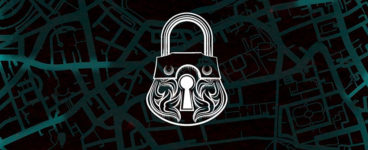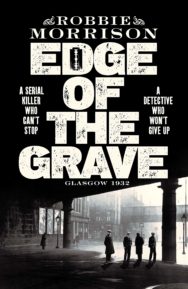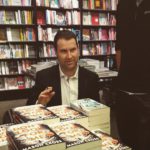‘Glasgow in this era, in the grip of the Great Depression, was a raucous, lawless city, with poverty, corruption, unemployment, extremist politics, sectarianism and the streets terrorised by razor gangs – in other words, the perfect location for a crime series!’
Glasgow is no stranger to fictional detectives, but we are particularly excited about the latest addition to the gang. We know you’re going to love DI Jimmy Dreghorn and his sergeant Archie McDaid and their criminal investigations in 1930s Glasgow. We spoke to author Robbie Morrison to find out more about his debut novel, Edge of the Grave.
Edge of the Grave
By Robbie Morrison
Published Pan Macmillan
Congratulations Robbie on the publication of your first novel, Edge of the Grave. Could you tell our readers what to expect?
Thanks. Edge of the Grave is the first book in a new historical crime series set in 1930s Glasgow, which Peter James has described as ‘a mesmerizing debut,’ and Mark Billingham as a ‘magnificent and enthralling portrait of a dark and dangerous city and the men and women who live and die in it, chilling and brutal, but also deeply moving.’ Far be it from me to argue with them!
It’s a gritty story that takes Detective Inspector Jimmy Dreghorn and his sergeant ‘Bonnie’ Archie McDaid from the flying fists and slashing blades of Glasgow’s gangland underworld to the backstabbing upper echelons of government and big business in the hunt for a twisted killer. Beyond the first book, the series will focus on the lives, loves and investigations of Dreghorn and McDaid, in what is planned to be a sweeping mix of crime thriller and family saga.
You’re an experienced writer of graphic novels. How did you bring your previous writing experiences to Edge of the Grave?
Well, it’s always good to challenge yourself and try something different but writing a crime novel is actually something I’ve wanted to do for longer than I’ve been writing comics and graphic novels. As much I like comics as a medium for storytelling, crime fiction has always been my real passion.
Obviously, there are more words – LOTS more words – in a novel. In comics, you have the artwork to help generate mood, but when you’re writing a comics script – even though the style of writing might be more conversational – you’re still intent on firing the artist’s imagination with your descriptions of place, character and action. That hopefully inspires them to bring something of themselves to the story.
When writing a novel, you’re also aiming to get readers’ imaginations working, so that they visualise characters, places, etc, and become immersed in the story. As a writer, the reader’s imagination is one of the most powerful tools you have. If you can spark that, then you can go anywhere.
While I’d say the writing in a novel has to be tighter in some ways, the basic principles of good storytelling are exactly the same. When the reader of a novel reaches the end of a chapter, you want them to immediately turn the page because they’re so engrossed they can’t stop themselves – just like a comics reader reaching the cliff-hanger end of an episode and being desperate to buy the following issue to find out what happens next. The mediums might be different, but it’s all about telling a good story ultimately.
You open the novel with a quote from William McIllvanney. How have you been influenced by Glasgow crime writers who have come before you?
The work of the late William McIlvanney, a writer capable of achieving greater insight in a single sentence than most of us could in an entire novel is probably the biggest influence – especially the Docherty and the Laidlaw novels. In fact, the title derives from one of those sentences in The Papers of Tony Veitch: ‘It was as if Glasgow couldn’t shut the wryness of its mouth even at the edge of the grave.’
I wanted to write a story that captured the power and drama of the era – crime, politics, wealth, poverty, attitudes, divisions, the spirit of the people and the spirit of the city and how they make each other what they are – but also hopefully have resonance to our world now. In terms of Scottish fiction, especially crime fiction, that’s something McIlvanney pioneered, to the extent that he inspired a whole new school of writing – Tartan Noir.
What is it about the city in the 1930s that inspired you to set your novel there?
I’ve had something of a fascination with Glasgow and the 1930s for as long as I can remember. I think it stems primarily from two sources: My family history (compiled into a handy volume a few years ago by my dad), which has connections to shipbuilding in Glasgow and along the River Clyde that stretch back four generations on both sides; and my love for the hard-boiled crime fiction of that period – from Dashiell Hammett to Raymond Chandler – and the gangster films of James Cagney and Humphrey Bogart, whose sharp-suited, fast-talking protagonists also influenced the street gangs that feature in the novel.
Glasgow in this era, in the grip of the Great Depression, was a raucous, lawless city, with poverty, corruption, unemployment, extremist politics, sectarianism and the streets terrorised by razor gangs – in other words, the perfect location for a crime series!
It’s the first book in a series. Do you know the shape of the novels to come or do you want each book to stand alone?
I’m writing Book Two just now, so I know where I’m going with that – honest! Each book will be certainly be designed to be read as a standalone in its own right, but there are sub-plots and character arcs that will play out over the series. I have quite a few of them roughed out in my head and they hopefully won’t be what people expect.
I have a fairly good idea for the plot of what would be Book Three, and beyond that, I have plenty of ideas for storylines, although the exact order isn’t set in stone. Obviously, the historical setting means that actual events are bound to impact on the characters, so that will also have a bearing on upcoming novels.
Can you tell us a little bit more about your detective, Jimmy Dreghorn? How does writing him compare to writing superheroes?
To be honest, while I’ve created plenty of larger-than-life characters in comics and graphic novels, I probably spent a lot of my comics career trying to avoid writing superheroes. I’ve always been drawn more towards human characters than superhuman. Frailties, flaws and vulnerabilities are much more interesting.
A quick bit of background first: Declaring war on the razor gangs that terrorised the city in 1931, Glasgow controversially appointed Percy Sillitoe – an Englishman! – as the new Chief Constable. Sillitoe recruited the toughest officers in Scotland to form Britain’s first flying squad. Patrolling the streets in radio-cars, they were nicknamed ‘the Untouchables’ by the press, after the elite unit put together in 1920s Chicago by FBI agent Eliot Ness to target the gangster Al Capone.
Our heroes, Inspector Jimmy Dreghorn and ‘Bonnie’ Archie McDaid are two of these ‘tartan’ Untouchables. Dreghorn’s background is partly inspired by my grandfather, who worked in black squads in shipyards along the Clyde and boxed under the patronage of one of Scotland’s wealthiest landowners, elements that feature strongly in the novel. Likewise, Archie McDaid is based upon a real policeman of the period; a larger-than-life bagpipe-playing Olympic wrestler and Heavyweight Boxing Champion.
From our modern perspective, Dreghorn would probably be seen as more progressive than many of his colleagues in the police force, but it’s not necessarily deliberate on his part. It’s more of an instinctual thing, something he can’t stop himself from doing rather than something he feels he should be doing. My thinking was that his ‘kill or be killed’ experiences during the Great War have made him step above petty prejudices such as gender, religion and class. Why is he a policeman? ‘Because I’ve seen the alternative,’ he says at one point in the book, referring to the horrors of WW1.
Edge of the Grave is being pitched as ‘Scottish Peaky Blinders meets Tartan Untouchables’. How does cinema and television influence your writing?
Dreghorn and McDaid and especially the idea to use the gangland backdrop of 1930s Glasgow as a location for a crime series have been in my head for over ten years, in fact, probably nearer twenty, which is a sobering thought. Those are definitely elements in the story, however, and as far as pitches go, it’s a good shorthand encapsulation of the sort of thing I was aiming for. It’s like what I was saying earlier about sparking people’s imaginations.
I’m sure film and TV have influenced my writing, though in the case of Edge of the Grave that’s just part of a big melting pot of influences. I’m aiming for a gritty sense of realism, but one that’s also tinged with the mood of classic hard-boiled crime fiction, film noir and gangster films – and shot through with that brand of humour that is both particularly Scottish and Glaswegian.
What are you reading now? What are you looking forward to reading this year?
I’ve just finished David Bishop’s Renaissance Florence thriller City of Vengeance, which I’d heartily recommend and has the likes of David Baldacci singing its praises. Right now: On a whim, I picked up A Study in Scarlet, Conan Doyle’s first Sherlock Holmes novel, on passing a bookshelf, read the first couple of pages and kept on going.
A lot of this year’s reading will be catching up on books from last year – Don Winslow’s Broken, Kate Summerscale’s The Haunting of Alma Fielding, The Inheritance of Solomon Farthing by Mary Paulson-Ellis and Agent Sonya, by Ben MacIntyre. I’m also looking forward to Craig Russell’s Hyde, which sounds great.
Edge of the Grave by Robbie Morrison is published Pan Macmillan, priced £14.99.
ALSO IN THIS ISSUE

 My Heart’s Content, My Greatest Gift
My Heart’s Content, My Greatest Gift
‘Instead my mind meandered beyond my hospital room. I imagined the reflections from fairy lights agi …

 Jeda Pearl Interviews: T. L. Huchu
Jeda Pearl Interviews: T. L. Huchu
‘In fact, I would argue a single, unitary Edinburgh doesn’t exist. What you have are multiple Edinbu …













